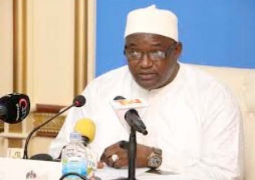World
Health Organisation (WHO) The Gambia office, have recently organised a platform
with the purpose of equipping the public through the media, on the Universal
Health Coverage (UHC).
Speaking
at the event, Momodou Ceesay, WHO health economist said health has been
declared as an individual human right, adding that everyone has a right to
access health care when they need it.
He added that what has been happening in the world is that, at least half of the population do not have full coverage of even the most basic essential health services which could be lack of income or the unavailability of the services
He
further noted that WHO estimated 800 million people spend more than 10% of
their income on health care when they are ill, adding that “if we consider the
amount of poverty in the world most of
the less developed countries, at least half of their population fall in among
the poverty line.”
Mr.
Ceesay elaborated that all the UN member states, including The Gambia, have
agreed to try and achieve UHC by 2030 as part of the Sustainable Development
Goal (SDG 3), which covers UHC and it deals, ensuring healthy lives and promote
wellbeing for all and at all ages.
“2030
is a long term goal but WHO has a medium term goal to set a path for its member
states to achieve SDG 3 to have what they call
the triple billion goal which is the set of strategic priorities that
WHO has outlined in their global program of work,” he said.
He
said UHC is aimed at ensuring everyone access to the health care they need,
emphasizing that it should be at an affordable price and it is also trying to
achieve the provision of all the people with needed health services and these
needs health services covers from promoting services, preventing, curative,
rehabilitative and palliative.
“No
country in the world ever fully achieve UHC because it is virtually impossible
for all the people to have access to the health care they need at all times and
at a low cost that they can afford,” he said.
He
added that this is as a result because there are different diseases which cost
higher and it is hard for poorer countries because of the resources it
requires.
“Even
though no country can fully achieve all coverage objective but that does not
mean that a country cannot aim to gradually increase and insure the UHC
improved, and as well to reduce the gap between need and utilisation, improve
quality and as well as the financial protection for those who cannot afford
it,” he lamented.
He
further explained that UHC does not mean free coverages for all possible health
interventions, regardless of the cost and it is not just about health
financing, UHC Covers all components of health systems.



